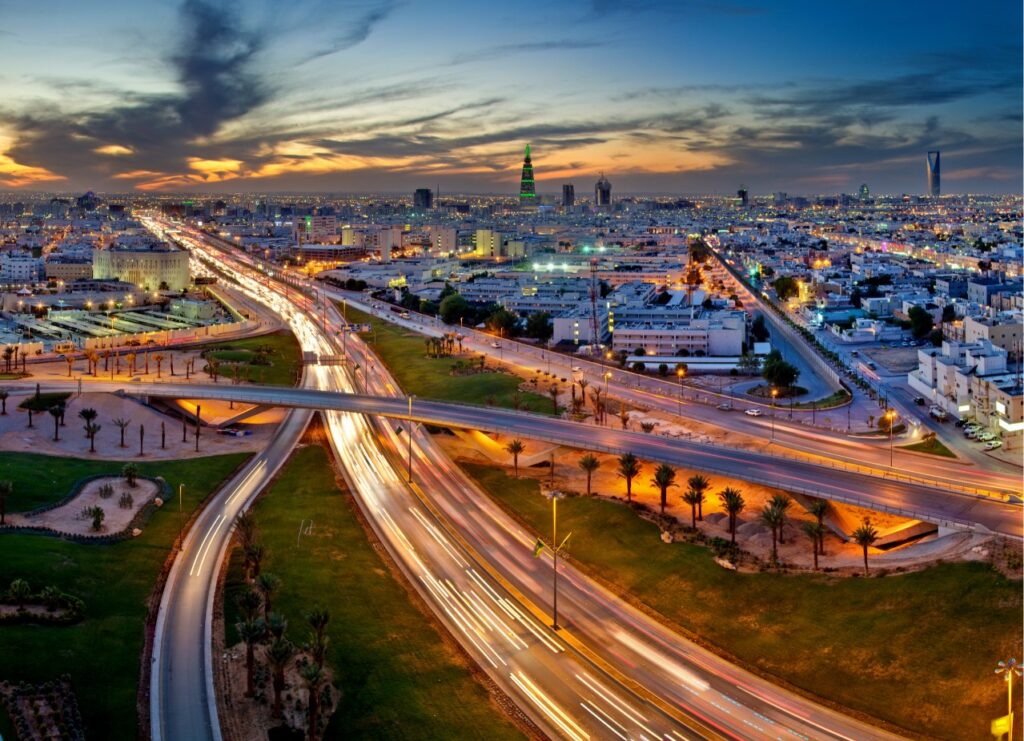Vision 2030 & Sustainability in KSA

In recent years, Saudi Arabia has made significant strides toward fostering a more sustainable and socially responsible business environment. As part of Vision 2030, the Kingdom is prioritizing sustainability and corporate responsibility, recognizing their crucial roles in long-term economic development and social progress. For businesses operating in Saudi Arabia, integrating these principles into their operations benefits the environment, society, and their bottom line. Here, we explore how businesses can incorporate sustainability and corporate responsibility into their operations in Saudi Arabia.
1. Aligning with Vision 2030
Saudi Arabia’s Vision 2030 outlines ambitious goals for sustainability, aiming to reduce oil dependency, increase renewable energy usage, and enhance environmental protection. Businesses aligning with these objectives can invest in solar and wind energy solutions to reduce carbon footprints, support the Kingdom’s renewable energy drive, and implement resource efficiency measures to cut water and energy consumption. Ensuring sustainable supply chains that are environmentally and socially responsible supports local industries and minimizes environmental impact.
The Kingdom’s environmental transformation, supported by regulatory changes such as establishing the Ministry of Environment, Water and Agriculture in 2016, has seen significant progress. Key achievements include the National Environment Strategy guiding environmental development, and initiatives like the Prince Sultan Institute for Environmental, Water and Desert Research promoting scientific research. The Research Fund for Energy and Environment fosters innovation in sustainable energy and environmental protection.
Saudi Arabia’s commitment extends to projects exceeding $1.1 billion in environmental reconstruction efforts. The establishment of the Environment Fund, Special Forces for Environmental Security, and specialized centers like the National Center for Meteorology and the National Center for Waste Management ensure effective implementation of environmental initiatives.
Underpinning these efforts is the Saudi Green Initiative, which aims to plant 10 billion trees, rehabilitate degraded lands, and increase protected areas. This initiative, along with the Middle East Green Initiative, demonstrates Saudi Arabia’s leadership in promoting a green economy, combating climate change, and creating sustainable cities and habitats.
The National Center for Vegetation Development and Combating Desertification plays a pivotal role in achieving these goals, targeting the revitalization of degraded forests, rehabilitation of pasturelands, and extensive tree planting in national parks. These efforts are set to reduce carbon emissions, combat desertification, restore biodiversity, and enhance climate-change mitigation through nature-based solutions.
2. Saudi Green Initiative Targets:
Launched by Crown Prince Mohammed bin Salman on March 27, 2021, the Saudi Green Initiative (SGI) has played a crucial role in accelerating environmental protection efforts, transitioning the energy sector, and implementing sustainability programs across various fields, including:.
Conservation and Rewilding Efforts:
- Aims to protect 30 percent of the Kingdom’s land and sea by 2030.
- Current protections cover 18.1 percent of land and 6.49 percent of marine environments.
- Over 1,660 endangered animals were rewilded, including Arabian oryx, gazelles, and Nubian ibex.
- Seven Arabian leopard cubs were born in Taif in 2023, boosting their conservation numbers significantly. Arabian leopards are critically endangered and endemic to the Arabian Peninsula, making each birth a crucial milestone in efforts to preserve this rare and iconic species.
Renewable Energy:
Targets include reducing carbon emissions by 278 million tons per annum by 2030.
Connected 2.8 GW of renewable energy to the Kingdom’s grid, powering over 520,000 homes.
An additional 8.4 GW in renewable energy sources are under construction, with 3.3 GW in development to power two million more homes.
Reforestation and Land Rehabilitation:
- Progress towards planting 10 billion trees; over 49 million trees and shrubs planted.
- Rehabilitated 94,000 hectares of degraded land, equivalent to more than 146,000 football fields.
These efforts reflect Saudi Arabia’s commitment to accelerating its energy transition and achieving significant environmental goals under the Saudi Green Initiative.
3. Environmental Stewardship
In line with the principles of the SGI, the Saudi Ports Authority (Mawani) signed a contract with Saudi-based waste management company Reviva for a recycling waste complex in Jeddah. Key details of the project include:
- Contract Value: 30 million Saudi riyals ($8 million).
- Project Area: 10,000 square meters.
This initiative is part of Mawani’s efforts to promote environmental sustainability, ensure marine safety, and develop a sustainable maritime sector. It aligns with the National Transport and Logistics Strategy and the Green Ports Initiative, aiming to:
- Boost Saudi Arabia’s position as a global logistics center.
- Enhance waste utilization by converting waste into valuable resources.
- Offer comprehensive waste management and recycling solutions.
- Minimize waste generation and improve waste management operations.
The Saudi Sustainable Building Programme achieved significant sustainability milestones by applying sustainability standards to over seventy projects, encompassing luxurious areas exceeding 50 million square meters. Key accomplishments included the application of the Advanced Sustainability Assessment System in residential, commercial, and community projects.
These initiatives demonstrate a commitment to raising operational efficiency, cutting back on energy and water use, and improving the quality of life for residents. The program emphasizes:
- Minimizing environmental harm from construction waste and materials.
- Creating green spaces.
- Establishing safe routes for bicyclists and pedestrians.
- Adhering to Saudi building code compliance and efficient standards for sustainability assessment certificates.
The program evaluates projects for sustainability at every stage of development, assigning ratings based on point totals:
- Rating Levels: Green (20 points) to Diamond (80 points or higher)
Services offered by the program aim to enhance the sustainability and quality of buildings and communities, promoting eco-friendly development and improving market efficiency by reducing material and financial losses from construction waste.
4. Governance and Ethical Practices
Since the announcement of Vision 2030, initiatives have been accompanied by a push for integrating ESG principles and targets in the private and public sectors.
- Transparency and Accountability: Saudi Arabian businesses increasingly adopt transparent operations and decision-making processes. The Saudi Stock Exchange (Tadawul) has implemented stringent disclosure requirements to ensure listed companies maintain transparency and hold themselves accountable to stakeholders. In 2021, Tadawul launched the Environmental, Social, and Governance (ESG) Index to promote sustainable investment practices. Additionally, Saudi companies have seen a 30% increase in ESG reporting since 2020.
- Ethical Standards: The Kingdom’s Vision 2030 emphasizes combating corruption and promoting integrity. The National Anti-Corruption Commission (Nazaha) plays a pivotal role in upholding high ethical standards across all sectors. In 2022, Nazaha reported recovering over SAR 6 billion ($1.6 billion) in misappropriated public funds and conducted more than 900 investigations.
- Stakeholder Engagement: Saudi Aramco actively engages with stakeholders through regular consultations and feedback mechanisms. In 2023, Saudi Aramco launched a new stakeholder engagement initiative called “Energy to the World.” This program included over 75 town hall meetings and workshops involving more than 80,000 participants from various stakeholder groups, including employees, local communities, suppliers, and government officials. The initiative aims to gather insights, address concerns, and collaboratively develop solutions to enhance corporate performance and community relations.
5. Reporting and Metrics
Saudi Arabia’s leading companies are mandated to ensure transparency and accountability by publishing detailed reports and setting clear performance indicators to track their progress and achievements.
- Sustainability Reporting: Saudi companies, including SABIC and Saudi Aramco, publish comprehensive sustainability reports detailing their progress, challenges, and future goals. SABIC’s 2022 Sustainability Report outlined a reduction of 11.2 million metric tons of CO₂ emissions, contributing to a 20% decrease in greenhouse gas emissions intensity since 2010. Saudi Aramco’s report also mentioned reducing freshwater consumption by 50% through advanced water recycling techniques.
- Key Performance Indicators (KPIs): Saudi Aramco has set a target to reduce carbon intensity by 15% by 2035 and is actively tracking progress. In 2022, they achieved a 10% reduction ahead of schedule.
- Third-Party Audits: Engaging third-party auditors, such as Ernst & Young or PwC, Saudi firms verify their sustainability claims, enhancing their credibility. In 2023, Saudi Aramco’s sustainability report was verified by KPMG, ensuring accuracy and transparency. Additionally, SABIC’s sustainability practices were audited by Deloitte, confirming compliance with global standards.
6. Leveraging Technology and Innovation
Saudi Arabia is at the forefront of leveraging digital tools, green technologies, and research & development to minimize environmental impact and optimize resource use.
- Digital Transformation: NEOM, the futuristic city project, incorporates smart city technologies to reduce waste and enhance efficiency. NEOM aims to be 100% powered by renewable energy and to house one million residents by 2030.
- Green Technologies: Investments in green technologies are evident in projects like the King Salman Renewable Energy Initiative, which targets 27.3 GW of renewable energy capacity by 2024. This includes solar and wind projects, such as the 300 MW Sakaka PV IPP and the 400 MW Dumat Al Jandal wind farm. Saudi Arabia has also invested $1.5 billion in developing hydrogen fuel technologies.
- Research and Development: Saudi Arabia fosters innovation through entities like the King Abdullah University of Science and Technology (KAUST), focusing on sustainable products and processes. KAUST’s research has led to advancements in desalination technology, reducing energy consumption by 40%. Additionally, KAUST has partnered with global tech companies to develop cutting-edge renewable energy solutions
7. Collaboration and Partnerships
Saudi Arabia has established several successful partnerships to drive national and global sustainability goals.
- Public-Private Partnerships: Saudi Arabia participates in public-private partnerships to achieve national sustainability goals. One notable example is the Riyadh Metro Project, a partnership between the government and several international private companies. The project involves six metro lines covering 176 kilometers, with 85 stations, and is designed to reduce traffic congestion and improve public transportation. The total investment in the project exceeds $22.5 billion. This partnership aims to enhance urban mobility, reduce carbon emissions, and support economic growth by providing efficient and sustainable transportation options for Riyadh’s residents and visitors. The project also supports job creation, with over 70,000 jobs expected to be generated during the construction and operation phases to reduce traffic congestion and improve public transportation. The total investment in the project exceeds $22.5 billion. This partnership aims to enhance urban mobility, reduce carbon emissions, and support economic growth by providing efficient and sustainable transportation options for Riyadh’s residents and visitors.
- Industry Alliances: Saudi businesses join industry alliances and networks, such as the World Economic Forum’s Global Lighthouse Network, to promote best practices in sustainability and corporate responsibility. In 2023, was recognized as a Lighthouse facility for its use of advanced digital technologies, resulting in a 50% increase in operational efficiency which simultaneously reduced energy consumption, waste generation and greenhouse gas emissions.
- NGO Collaboration: Collaborations with NGOs, such as the King Khalid Foundation, help address social and environmental issues more effectively. The Foundation’s programs have empowered over 10,000 individuals through education and training initiatives aimed at sustainable development. Additionally, the foundation has funded over 200 community development projects across the Kingdom.
Incorporating sustainability and corporate responsibility into business operations in Saudi Arabia is a strategic imperative that aligns with the Kingdom’s Vision 2030. By adopting environmentally sustainable practices, promoting social responsibility, ensuring good governance, leveraging technology, and collaborating with stakeholders, businesses can contribute to a more sustainable and equitable future. Access KSA is committed to supporting businesses in their sustainability and CSR journeys, offering expert guidance and resources to help them achieve their goals.





Leave a comment